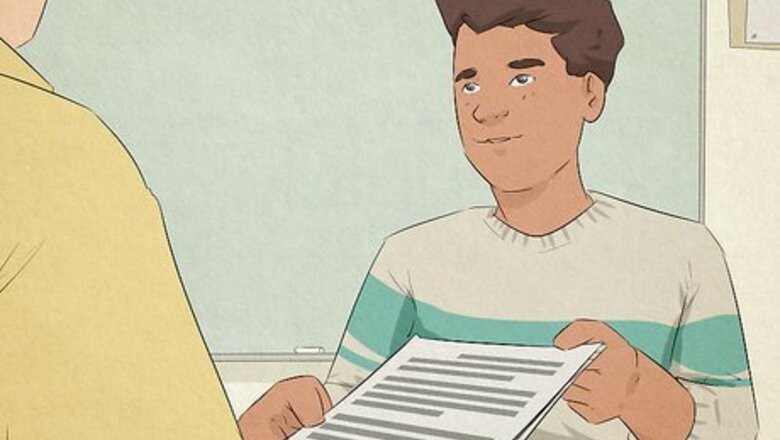
views
Gathering Information

Collect any relevant information the student can give you. When a student asks you to write for them, ask them to tell you a little about themselves. Let them know you are happy to help and you want to do the best job possible. Even if you've known them a while, it’s always a good idea to ask for some helpful documents. If they don’t have everything you might expect, that’s okay, just ask them questions about their experience instead. Good things to request include: A resume or CV A cover letter or application essay Details of the program or job that they’re applying to Any other information about their academic career, work experience, or extracurriculars

Ask for details about the applicant’s goals. Make sure to get things like a resume, but it's good to also take a little time to learn more about the student's goals. Try to have a casual chat with them, but if that's not possible, ask them to write out a brief email to answer your questions. This will help you to know what to highlight in your letter. Good questions to ask include: What interests you about this program/position? What are you hoping will come out of this degree/position? Can you tell me a little more about your specific career/academic goals?

Request all of the necessary contact information and due dates. Application deadlines and submission guidelines are usually pretty inflexible, so check with the student to make sure you know exactly how and when to submit your letter. Try to send your letter in before the deadline, if possible. You never know what could pop up and cause you to forget to send it if you wait until the last minute. A lot of times you can just send the letters via email, but some programs require you to use a special system. Check this out ahead of time to make sure you know how to set up an account and use the portal. Ask the student if there is a specific person you can address the letter to. If not, it’s fine to use the standard, “To Whom it May Concern,” or “Dear Committee Members.”

Take at least an hour to write a letter several days before the due date. A good rule of thumb is to make sure you have a minimum of 2 weeks to write the letter. If a student asks for a last-minute letter, it's okay to say no. A good letter takes time and mental energy, so you might not be doing them a favor by writing a rushed letter. Allow yourself at least an hour to write the letter. You might want to come back to it later to edit it with fresh eyes. Most letters are submitted electronically these days but double-check to make sure you don’t have to mail it. If you do, allow at least a week between the time you send it and the due date.

Say “no” to requests from students you cannot fully support. Recommendation letters carry a lot of weight, and you don’t want to harm someone’s chances of acceptance by writing a lackluster letter. If you don’t know the student well or if you have reservations about their skills, tell them that you aren’t the appropriate person to write in support of them. Try saying, “I’m sorry, I don’t feel I know you well enough to do you justice in a letter. I think it would be best if you ask someone else.”
Covering the Essential Information
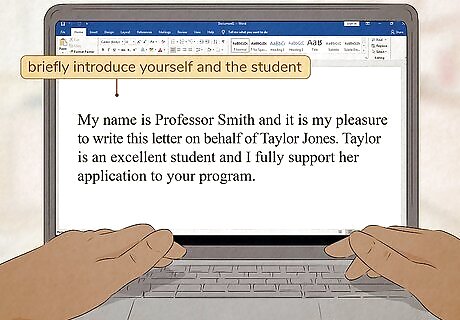
Open the letter by briefly introducing yourself and the student. This lets the reader know who you are and why you are writing. You can keep this first paragraph pretty short. A couple of sentences will do it. You can write, “My name is Professor Smith and it is my pleasure to write this letter on behalf of Taylor Jones. Taylor is an excellent student and I fully support her application to your program.”
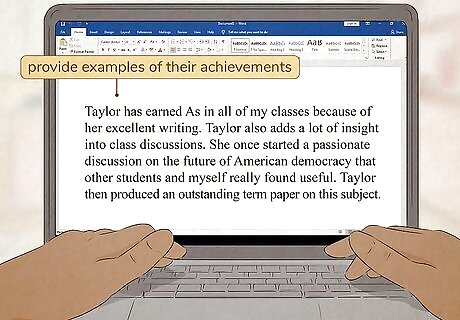
Provide examples of the student’s achievements in the next paragraph. Being specific helps the reader get to know your student a little bit better. Avoid sweeping generalizations, and pepper the letter with specific reasons why you support the student. Tell the reader exactly how you know the student to let them know why you're qualified to write the letter. Say, “I’ve been Taylor’s academic advisor and professor for 4 years. She has earned As in all of my classes because of her excellent writing. Taylor also adds a lot of insight into class discussions. She once started a passionate discussion on the future of American democracy that other students and myself really found useful. She went on to write a creative and sophisticated paper on the same topic.” Avoid something that is vague, like, “Taylor's a good student.”
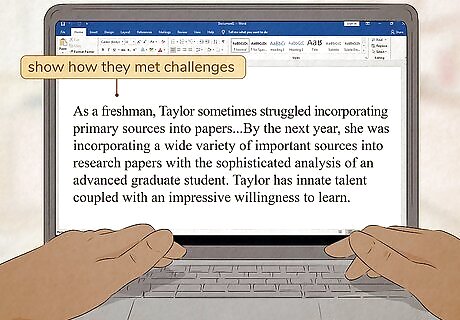
Point out areas where the student has demonstrated learning. Almost any employee or graduate program wants to know that the student is capable of growing and meeting challenges. Think of a time when you were really wowed by the student’s progress and write about that in a couple of sentences. Don’t forget to be specific here, too. Try something like, “As a freshman, Taylor sometimes struggled using primary sources. She made an effort to visit my office hours and ask for help. By the next year, she was incorporating a wide variety of important sources into research papers with the sophisticated analysis of an advanced graduate student. Taylor has innate talent coupled with an impressive willingness to learn.” Don’t write something general like, “Taylor made a lot of improvement and is a great writer now.”
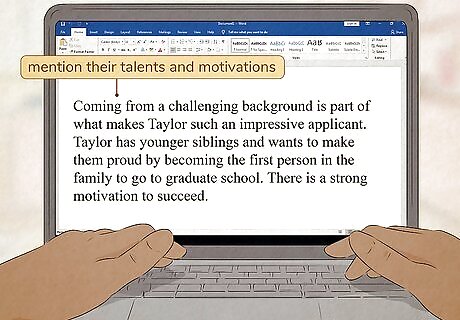
Discuss special talents and motivations to make the student stand out. A recommendation letter is a place to really emphasize what makes the applicant special. While you want the letter to be professional, it’s okay to make your subject as human as possible. This will help the reader get a better picture of who the applicant really is. You might say, “Coming from a challenging background is part of what makes Taylor such an impressive applicant. Taylor has younger siblings and wants to make them proud by becoming the first person in the family to go to graduate school. There is a strong motivation to succeed.” You could also mention a student's talent if it's relevant. For example, you could say, "Taylor is passionate about music and is an incredible pianist. While that might not seem relevant to your program, it is because Taylor uses her love for music to infuse her research with insights about the cultural impact of music."
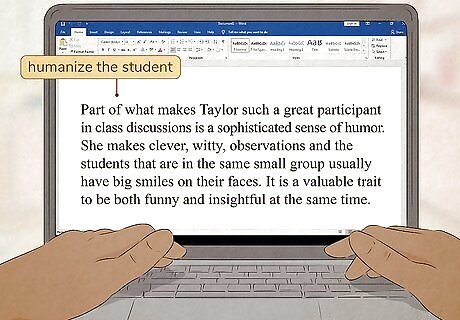
Mention personality traits to humanize the student. This is another good way to personalize your letter and help the student stand out from the pack. Again, stay professional, but allow some of the applicant’s personality to come through in your letter. Write something like, “Part of what makes Taylor such a great participant in class discussions is a sophisticated sense of humor. She makes clever, witty, observations and the students that are in the same small group usually have big smiles on their faces. It is a valuable trait to be both funny and insightful at the same time.” Don’t say something unprofessional like, “It seems like Taylor is very popular and probably the life of the party.”
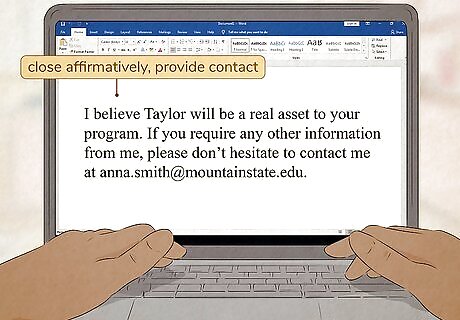
Finish the letter by offering to help further. You’ve reached the end of your letter and the hard part is done! Just write a very brief paragraph indicating that you are available for any follow-up questions. Say something like, “I believe Taylor will be a real asset to your program. If you require any other information from me, please don’t hesitate to contact me at anna [email protected].” Sign off with a professional closing like “Sincerely” or “Respectfully” and then your name and title.
Striking the Right Tone
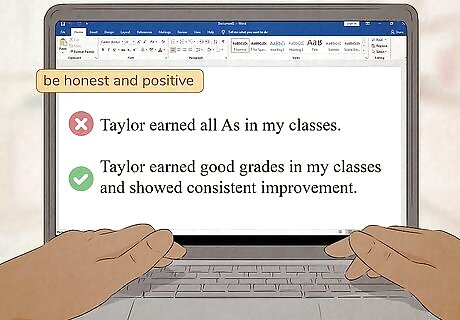
Be honest and positive in your assessment. One of the cardinal rules of letter writing is to be upfront and totally honest. Don’t add false or misleading statements. It won’t help anyone. Take care to also be positive. Remember, you only agreed to write the letter because you believe in this student. Avoid saying anything negative, as that could harm their chances. Don’t say “Taylor earned all As in my classes,” if that’s not true. You can still keep it positive by saying, “Taylor earned good grades in my classes and showed consistent improvement.” Even if you have some reservations, try to phrase them in a positive way. For example, try, “Taylor’s greatest strength has not always been research, but she's put in so much effort to improve that I believe there will be continued growth.” That sounds better than, “Taylor isn’t the best researcher in my class, but is good at writing.”
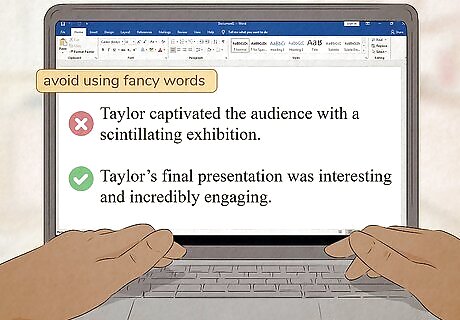
Write using words you feel comfortable with. Don’t worry, there’s no need to try to sound all fancy here. Use vocabulary that you would typically use in a professional setting. You don’t have to try to find words to make yourself (or the student) seem smarter. Writing in a different tone could actually make your letter seem a little phony or insincere. It’s fine to just say, “Taylor’s final presentation was interesting and incredibly engaging,” instead of, “Taylor captivated the audience with a scintillating exhibition.”
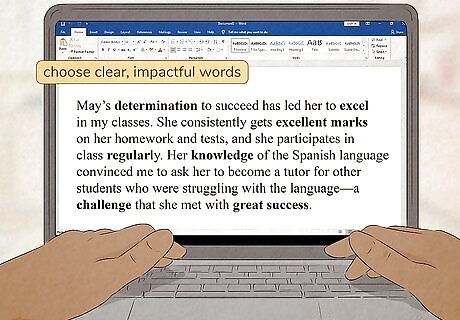
Make sure to use specific language and avoid vague statements. Remember, you want to paint a picture of the applicant and their strengths. The best way to do this is to choose clear, impactful words. Here are some great adjectives to use: Adaptive Ambitious Bright Intelligent Intuitive Resourceful Thoughtful
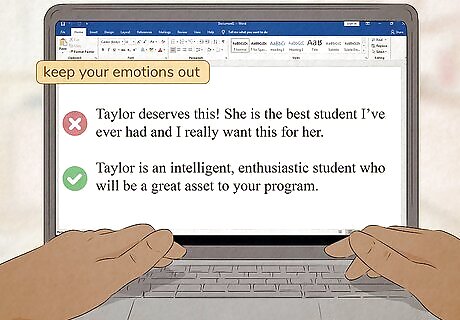
Stay professional and keep your emotions out of the letter. Since you’re recommending this person, you obviously want to help them succeed. That’s great, just make sure to stress that in a professional way. Try not to gush even if you’re tempted to extol their every virtue. Writing “Taylor is an intelligent, enthusiastic student who will be a great asset to your program,” is better than saying, “Taylor deserves this! She is the best student I’ve ever had and I really want this for her.”
Avoiding Common Mistakes
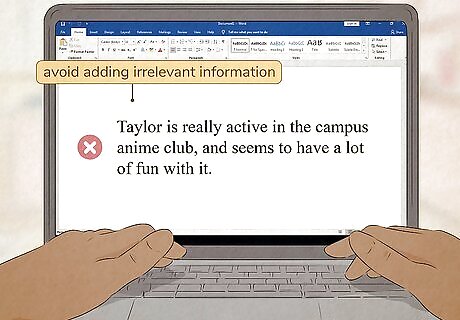
Skip any information that’s not relevant. While you want to include details and personality traits, you don’t have to give the applicant’s life story. Only highlight traits and examples that are relevant to what the person is applying for. The reader doesn’t need to know that the applicant has great taste in fashion unless they are applying for a program or job that involves fashion, for example. Don't add anything like, "Taylor is really active in the campus anime club, and seems to have a lot of fun with it," as that doesn't really give your reader any indication of why they would need to know something like that.
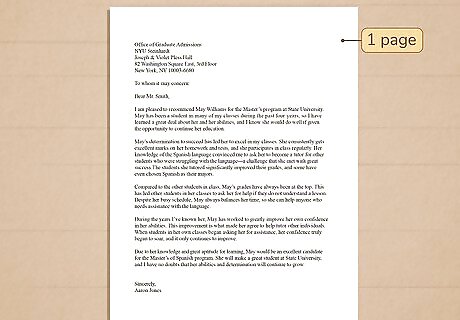
Keep all recommendation letters to about 1 page. Did you know that letters written on behalf of males are almost always longer than those written on behalf of females? Even when it is unconscious, gender bias exists in a lot of letters. One way to avoid even accidental bias is to make sure your letter is at least 1 page long, preferably a little more. You can also take care to emphasize accomplishments over effort, and avoid including an abundance of personal information. Use words like “research” and “performance” and include quantitative facts whenever possible. For example, “Taylor averaged the highest grades in the program for 3 semesters in a row.”
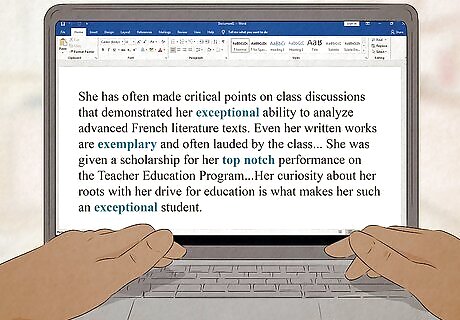
Choose your adjectives carefully to avoid bias. Sometimes we accidentally use different adjectives to describe people of different genders. Read your letter carefully to make sure you would use the same adjectives no matter who you are writing for. If you’re writing for a woman, avoid adjectives like: Compassionate Warm Caring Helpful Tactful



















Comments
0 comment